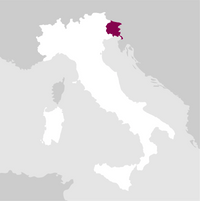描述
Still white wine from Friuli-Venezia Giulia, produced by Marco Felluga. Made with Ribolla Gialla grapes, 0.75L bottle, 2024 vintage. A wine that expresses the grape's freshness and elegance, with an intense aroma and notes of exotic fruit, grapefruit, and apple.
詳細資訊

香水

顏色

味道
服務於:
08 - 10 °C.
長壽:
03 - 05 years

搭配
- 創業年份: 1956
- 釀酒師: Ilaria Felluga, Alessandro Sandrin
- 生產的瓶子: 550.000
- 公頃: 100
The path initiated by Marco Felluga was carried forward with devotion by his son Roberto, the fifth generation of passionate winemakers. The pillars on which Roberto Felluga based his work and approach to the world of wine include a strong focus on sustainability and environmental preservation.
Today, Roberto’s daughter, Ilaria Felluga, represents the sixth generation leading the winery with the same passion and dedication that have always distinguished her family. 閱讀更多


| 名称 | Marco Felluga Collio Ribolla Gialla Maralba 2024 |
|---|---|
| 类型 | White still |
| 葡萄酒名称 | Collio DOC |
| 年份 | 2024 |
| 容量 | 0,75 l |
| 酒精度 | 12.5% 按體積 |
| 葡萄品种 | 100% Ribolla Gialla |
| 国家 | Italy |
| 产地 | Friuli-Venezia Giulia |
| 供应商 | Marco Felluga |
| 产地 | Villages of Oslavia and Capriva del Friuli (GO). |
| 气候 | Altitude: 80 50 m. a.s.l. |
| 土壤成分 | Hilly, formed during the Eocene epoch with an alternation of marls and sandstones. its impermeability causes surface water run-off with consequent soil erodibility, leading to a very gentle morphology. |
| 栽培系统 | Guyot. |
| 每公顷产量 | About 1.2 kilograms per plant. |
| 收获 | All hand picked at the end of September. |
| 酿酒工艺 | After harvesting, the grapes are separated from the stalks. The must and pulp undergo a cold maceration on the skins, followed by a light pressing to separate the skins. Fermentation takes place in stainless steel temperature-controlled tanks. |
| 陈酿 | The wine thus obtained is left to refine for some months on the lees before being bottled. |




